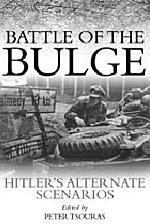 "This year’s sixtieth anniversary of
the Battle of the Bulge, also
called the Ardennes Offensive,
presents the timely opportunity to
examine not only the great
German gamble of December 1944
but the preceding operations that
led to that point, beginning with
the D-Day landings in June. The
colorful guise of alternate history is
the medium through which the
workings of history are illustrated.
"This year’s sixtieth anniversary of
the Battle of the Bulge, also
called the Ardennes Offensive,
presents the timely opportunity to
examine not only the great
German gamble of December 1944
but the preceding operations that
led to that point, beginning with
the D-Day landings in June. The
colorful guise of alternate history is
the medium through which the
workings of history are illustrated.
The historian Geoffrey Parker notes, ‘Counterfactual’ calcula-tions have, of course, been scorned by many historians – especially by those who believe that major events must stem from major causes. ‘Two centuries ago, however, Samuel Johnson eloquently demolished these doubts: The caprices of voluntary agents laugh at calculation. It is not always that there is a strong reason for a great event. Obstinacy and flexibility, malignity and kindness, give place alternately to each other, and the reason of these vicissitudes, however important may be the consequences, often escapes the mind in which the changes are made.’
 There has been no greater stage for the demonstrations of Dr Johnson’s
statement than the Northwest Europe Campaign of 1944–5. Like dark pearls strung
on a thread, the controversies of this campaign follow it from beginning to end.
These are not merely the arguments of old soldiers reliving the time when their
lives burned with an intensity they would never again achieve and academic
historians who never feel any passion at all as they disturb the dust of their books.
These controversies had price tags measured in human lives in the hundreds of
thousands to the millions. They each represent a road not taken, a road that
would have likely led to an earlier end of the war from the early Fall of 1944 to the
early days of 1945. The consequences of
those roads not taken were enormous,
not only in their butchers’ bills but in the
entire political and military nature of the
postwar world.
There has been no greater stage for the demonstrations of Dr Johnson’s
statement than the Northwest Europe Campaign of 1944–5. Like dark pearls strung
on a thread, the controversies of this campaign follow it from beginning to end.
These are not merely the arguments of old soldiers reliving the time when their
lives burned with an intensity they would never again achieve and academic
historians who never feel any passion at all as they disturb the dust of their books.
These controversies had price tags measured in human lives in the hundreds of
thousands to the millions. They each represent a road not taken, a road that
would have likely led to an earlier end of the war from the early Fall of 1944 to the
early days of 1945. The consequences of
those roads not taken were enormous,
not only in their butchers’ bills but in the
entire political and military nature of the
postwar world.
This team of British, Canadian, and American military historians has explored these very alternatives on the premise that history, as Dr Johnson explained, does not run along a well-worn groove. It is a continuously shifting synthesis of chance, design, character, accident and luck, both good and bad. History is a constantly shifting array of decision nodes – the ultimate game of choice and chance based on strategy and guessing in the dark. ”
The Battle of the Bulge: Hitler’s Alternate Scenarios will be published later this year.
Back to Greenhill Military Book News No. 129 Table of Contents
Back to Greenhill Military Book News List of Issues
Back to Master Magazine List
© Copyright 2004 by Greenhill Books
This article appears in MagWeb.com (Magazine Web) on the Internet World Wide Web.
Other articles from military history and related magazines are available at http://www.magweb.com